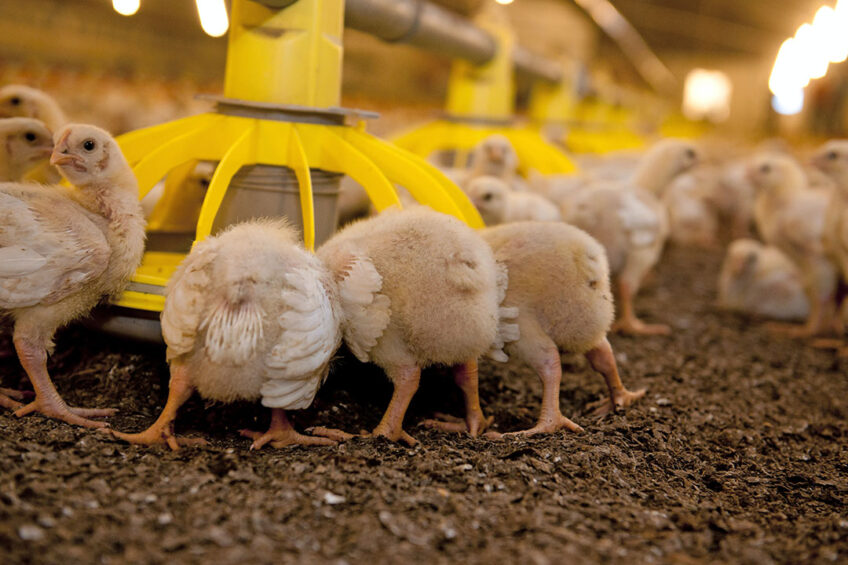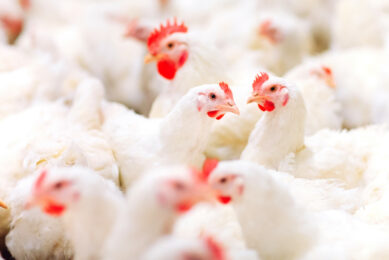Lutein: A valuable additive in broiler diets

Lutein is not only a colouring agent in poultry products but also contributes to the regulation of the mucosal barrier function and inflammatory responses of broilers.
Broilers are frequently exposed to various immunological stresses, which lead to intestinal damage, weakened immunity, and growth retardation. In large-scale farming, many factors such as vaccination, drugs, stocking density and temperature can affect the immunologic status of birds and trigger immune responses directly or indirectly. Under stress, chickens are also vulnerable to enteric diseases, which affect their growth performance.
Intestinal integrity
The intestine is the primary site of digestion and nutrient absorption, so maintaining intestinal integrity is essential for animal health. The intestinal mucosal epithelial cells and the intercellular tight junctions maintain intestinal integrity. Disruption of the intestinal barrier results in luminal inflammatory molecules penetrating the lamina propria, leading to persistent inflammation and tissue destruction.
Lutein in poultry diets
Safe and effective nutritional additives designed to modulate the immune function offer an important way to protect chickens from immunological stress. Lutein belongs to the carotenoids, which are widely distributed in vegetables, fruits, and flowers. But the lutein product applied in poultry production mainly comes from marigold petals. Studies confirm that lutein is not only a colouring agent for poultry products but also contributes to reducing the parameters of systemic inflammation in growing chicks. Lutein possesses antioxidant and immunomodulatory functions. In this study, published in Poultry Science (2022), researchers investigated the effects of lutein on the jejunal mucosal barrier function and inflammatory responses of broilers in an immune-challenged environment.
LPS challenge
To investigate the regulatory mechanisms of lutein on intestinal inflammation, lipopolysaccharide (LPS) was used to establish an immunological stress model to explore the protective effect of lutein on the intestinal mucosal barrier in broiler chickens. Lipopolysaccharide (LPS), which is an essential component of the cell wall of gram-negative bacteria and an effective activator of innate immune responses, can lead to inflammatory mediator production.
In this study, day-old yellow-feather broilers were randomly allocated to 3 groups. The groups were fed a broken rice-soybean meal basal diet with either 0, 20 or 40 mg/kg lutein (CON, LU20 and LU40, respectively) added, for 26 days. On days 21, 23 and 25 of the trial, broilers were intraperitoneally injected with LPS (1 mg/kg body weight). The researchers focused their measurements on lutein’s main site of effect, which is the jejunum, derived from their previous study.
Growth performance
As compared to the control group, dietary supplements containing 40 mg/kg lutein significantly improved the growth rate of broilers for the total period (days 1 to 26). Lutein also promoted efficient utilisation of feed as was observed by a significantly lower feed-to-weight gain ratio. The improvement in growth was attributed to the observed improvements in intestinal morphology and barrier functions.
Improving intestinal morphology and barrier function
By observing the changes in villi, intestinal epithelial cells and the tight junction between adjacent cells, the researchers identified regulatory structures associated with the damaged or healthy intestinal mucosa. The main structure was the microvilli which form the intestinal brush border structure, which increases the surface area of cells and improves the ability to absorb nutrients and receive stimuli. The results showed that, with increased lutein in the diet, the villus damage in the 40 mg lutein group gradually decreased, although the villus area was similar to that in the control group. It was also found that the microvilli in the control group were broken and disordered, while the microvilli in the 40 mg lutein group were dense and regular; this led to the conclusion that dietary 40 mg/kg lutein supplementation could repair LPS-induced villi damage.
In the current study, both 20 and 40 mg/kg lutein supplementation alleviated the decrease of goblet cells induced by the LPS challenge, as increased goblet cell density was observed. Studies show that intestinal epithelial cells are a single layer of cells lining the lumen that permit the translocation of nutrients, electrolytes, and water from the lumen into the blood circulation system while preventing the passage of harmful intraluminal entities. Goblet cells are specialised intestinal epithelial cells, which are distributed between monolayer columnar cells and can secrete biologically active products to protect against bacterial invasion. In addition, goblet cells are essential for maintaining the integrity of the intestinal epithelium and mucosal barrier.
Another observation was that 40 mg/kg lutein supplementation inhibits LPS-induced mitochondria damage. Enterocyte mitochondria are involved in regulating numerous aspects of cellular activity, including the regulation of gut functions such as intestinal barrier integrity and mucosal immune responses. Maintaining the intestinal epithelial barrier is an energy-dependent process and mitochondrial dysfunction leads to lower energy production, resulting in the loss of intestinal epithelial barrier integrity, apoptosis, and bacterial invasion.
Suppressing inflammation
Impairment of the intestinal barrier function is usually accompanied by inflammation, promoting the release of pro-inflammatory cytokines such as interleukin-1β (IL-1β) and interleukin-6 (IL-6). In this study, it was found that lutein inhibits the expression of IL-1β and IL-6 but enhances the expression of anti-inflammatory cytokines IL-4 and IL-10, with the best effect found in the 40 mg/kg lutein group. In addition, both 20 and 40 mg/kg lutein supplementation reduced the protein expression of nuclear factor (NF-κB) which up-regulates genes involved in inflammation development and progression.
Regulation of tight junction proteins
Tight junctions, which are the key component of the mucosal barrier, play an important role in regulating intestinal permeability. The expression of tight junction proteins in healthy intestinal tissue is significantly higher than that in inflammatory mucosa. In the current study, dietary 20 and 40 mg/kg lutein supplementation reversed the down-regulations of the mRNA expressions of tight junction protein occludin, claudin-1 and ZO-1 induced by the LPS challenge. Taken together, the results revealed that 40 mg/kg lutein supplementation is an optimal dose for regulating intestinal barrier function.
It was concluded that, when there is an immune challenge, lutein improves the intestinal barrier function and tames the inflammation by reducing intestinal epithelial cell destruction, strengthening tight junctions, and inhibiting the inflammation signalling pathways. Overall, 40 mg/kg lutein was recommended as the optimal dosage for broilers under the observed immune challenge.
Source: Effects of lutein on jejunal mucosal barrier function and inflammatory responses in lipopolysaccharide-challenged yellow-feather broilers. Poultry Science (2022) Volume 101, Issue 12, December 2022











